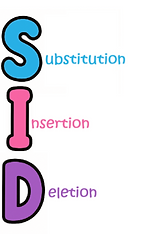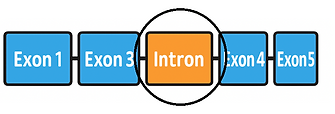top of page


Types of Mutations
Types of Mutations
Changes in base/gene sequence causing often a non functional/no protein to be produced.


Changes in base sequence Change to genes/sections of chromosomes
Less lethal More lethal
Changes to sections of chromosomes (genes).
These mutations cause more substantial changes
& are more likely to be lethal to the organism




Changes in base sequence

Chromosome Structure Mutations

A section is chromosome is added from a
non homologous chromosome.
Effect = non functional protein

A section is chromosome is reversed.
Effect = non functional protein


A section is chromosome is removed.
Effect = no protein produced



A section is chromosome is added from its
homologous chromosome.
Effect = non functional protein/evolutionary advantage
Evolutionary advantage of Duplication mutations
Original copy of gene
Can still produces protein.
Extra copy of gene
Can undergo a beneficial mutation to give a selective advantage for survival.
Single Gene Mutations
When a base is swapped within the sequence.



When a base is added into the sequence.
When a base is removed from the sequence.
& are both frameshift mutations.
Effect on gene
Affect ALL codons (3 base sets) AFTER mutation.
Effect on protein
Affects ALL amino acids AFTER mutation.
Protein Likely to be non functional.


Types of Substitution Mutations
Only 1 codon affected
Little effect OR non functional protein


Premature STOP codon created by substitution.
Shortened protein produced.
Intron left in mature transcript.
Non functional protein produced.

bottom of page